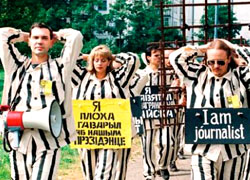“Reporters without Borders”: Belarusian authorities become “Enemies of Internet”
12- 2.02.2010, 15:43

No matter how Lukashenka would call his decree on Internet, control over the web is to become more tough, believes the human rights organisation “Reporters without Borders”.
In an interview to Radio Svaboda Lucie Morillon, Head of Reporters Without Borders' Internet Freedom Desk, stated:
“No matter how Lukashenka calls this decree, it is not meant for increasing internet freedom in the country. In reality it makes control over the Internet tougher. There are items in the decree that say that state, that internet providers are to block access to websites considered extremist by the government, and that providers are to store information about services rendered by them for 5 years. In reality these are measures for increasing spying upon citizens and the things they do and read on the web. It is not only the way to keep track of dissenters and people criticizing the government, but also an attempt to intimidate people searching for information which is lacking in traditional media, on the web. This decree should bring about self-censorship, which can seriously influence the freedom of expression in the future,” the expert believes.
Lucie Morillon said the following about the international practice of control over the Internet:
“Such methods are used by other countries as well. If we look at the list of Enemies of the Internet, created by “Reporters without Borders”, we can see such countries as China, Burma, Vietnam, Saudi Arabia, which use strict filtering of the web and monitor their citizens’ actions online. This step which increases toughness of censorship on the web in Belarus undoubtedly makes the country join the club of “Internet enemies”. It cannot be called unexpected. Earlier Lukashenka stated that his policy towards Internet would be based on the Chinese model. And that’s exactly how he acts,” the human rights activist said.
We remind that scandalous Decree “On Measures for Revising Use of the National Segment of the World Wide Web,” has been signed by Lukashenka and is to come into effect on July 1. The text of the draft decree appeared on the Internet in last December. It brought on criticism by the Belarusian media community and international human rights organizations, including OSCE. Independent experts have no doubts the document is primarily prepared to block pro-opposition Internet resources during elections.









